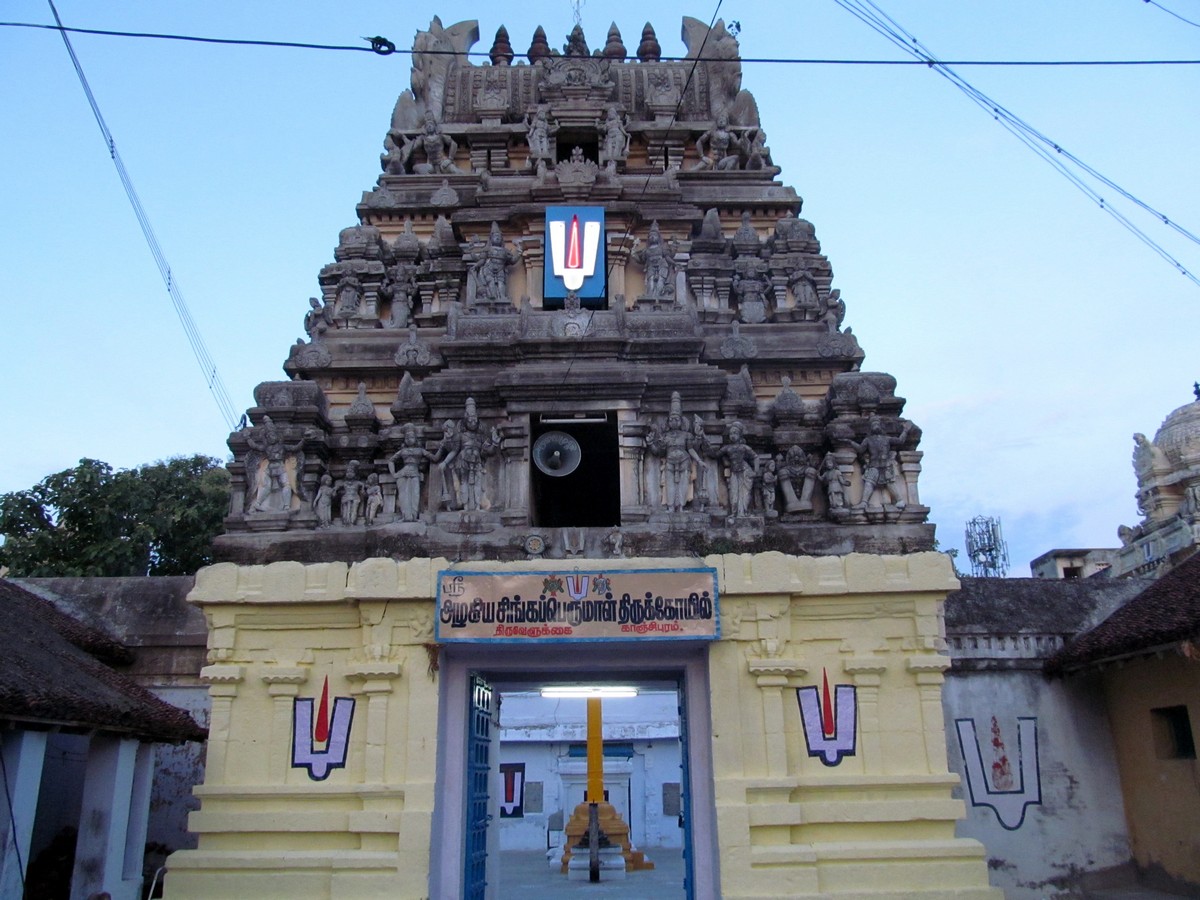This is one of the 108 Divya Desas of Lord Vishnu. According to scriptures, Lord granted darshan to sage Brugu from under the Kanaka Vimana facing east. Saint Peyazhwar in his hymns praises this shrine equal to that of Lord Uppiliappan and temples of Kumbakonam and Tirupathi.
Vaishnava Acharya Sri Mahadesikan had praised Perumal in his celebrated Kamasikashtakam. It is believed that chanting this sloka daily will bring in tallest benefits of the blessings of Lord Narasimha. The shrine is also known as Kamashika Narasimha Sannadhi.
Of the Avatars-incarnations of Lord Vishnu, Sri Narasimha Avatara is considered great representing His "Protection Readiness for His devotees. In this Avatar He came to the rescue of His devotee instantly from a pillar. After destroying Hiranya, Lord wanted peace. Tamil word Vaell means desire.
Perumal had the desire to be calm and peaceful in this place, it came to be known as Velirukkai which later changed as Velukkai. A group of demons came to destroy a yajna proposed by Lord Brahmma. He surrendered to Lord Perumal for protection.
As Perumal appeared from a pillar to protect Prahladha in lion-human form (Narasimha), He came now in the same form from Hasthisailam cave and drove the demons. They disappeared from this place in Kancheepuram. Lord stayed there as Yoga Narasimma facing east. Lord is known as Aall, Hari and Mukunda Nayakan.
The temple is open from 7.00 a.m. to 11.00 a.m. and from 5.00 p.m. to 7.30 p.m.
Moolavar - Mugunda Nayagan, Yoga Narasimhan
Utsavar - Azhagiya Singar
Thayar - Amrudhavalli, Velukkaivalli
Blessing Pose - Sitting Posture Facing West
Vimanam - Kanaga Vimanam
Kshetram - Sathyavradha Kshetram
Theertham - Prahalatha Theertham, Kangasaras
Tiruvelukkai located in Kanchipuram in the South Indian state of Tamil Nadu, is dedicated to the Hindu god Vishnu.
Constructed in the Dravidian style of architecture, the temple is glorified in the Divya Prabandha, the early medieval Tamil canon of the Azhwar saints from the 6th - 9th centuries AD.
It is one of the 108 Divyadesam dedicated to Vishnu, who is worshipped as Azhagiya Singar and his consort Lakshmi as Amruthavalli.The temple is believed to have been built by the Pallavas of the late 8th century AD, with later contributions from Medieval Cholas and Vijayanagar kings.
Azhagiya Singar is believed to have appeared to slay Hiranya, the demon king. Six daily rituals and three yearly festivals are held at the temple, of which the Krishna Janmasthami festival, celebrated during the Tamil month of Aavani (August-September), being the most prominent.
The temple rituals are performed six times a day: Ushathkalam at 7 a.m., Kalasanthi at 8:00 a.m., Uchikalam at 12:00 p.m., Sayarakshai at 6:00 p.m., Irandamkalam at 7:00 p.m. andArdha Jamam at 10:00 p.m.
After Narasimha avatharam, Lord Vishnu appeared as Narasimha again to safeguard the people who were being troubled by asuras.
The Lord chased
the asuras away and decided to stay here out of his own desire to
continue protecting people from evil forces. Hence the place got its
name as Velukkai- where Vel means Wish and irukkai means stay.
Do:
- Do pray your Ishta Devata before pilgrimage to Temple.
- Do contact Temple Devasthanam information centre for enquiry, temple information and for Pooja details etc.
- Do reserve your travel and accommodation at Temple well in advance.
- Do bath and wear clean clothes before you enter the temple.
- Do concentrate on God and Goddess inside the temple.
- Do maintain silence and recite your Istamantram to yourself inside the temple.
- Do observe ancient custom and traditions while in Temple.
- Do respect religious sentiments at Temple.
- Do deposit your offerings in the hundi only.
Don't s:
- Do not come to Temple for any purpose other than worshipping of God and Goddess.
- Do not smoke at Temple.
- Do not consume alcoholic drinks at Temple.
- Do not eat non-vegetarian food in the Kshetram.
- Do not approach mediators for quick Darshanam. It may cause inconvenient to others.
- Do not carry any weapon inside the temple.
- Do not wear any head guards like helmets, caps, turbans and hats inside the temple premises.
- Do not perform Sastanga Pranama inside the Sanctum Sanctorum.
- Do not take much time while performing Sparsa Darshanam to God in Garbhagriha.
- Do not buy spurious prasadams from street vendors.
- Do not encourage beggars at Temple.
- Do not spit or create nuisance in the premises of the temple.
